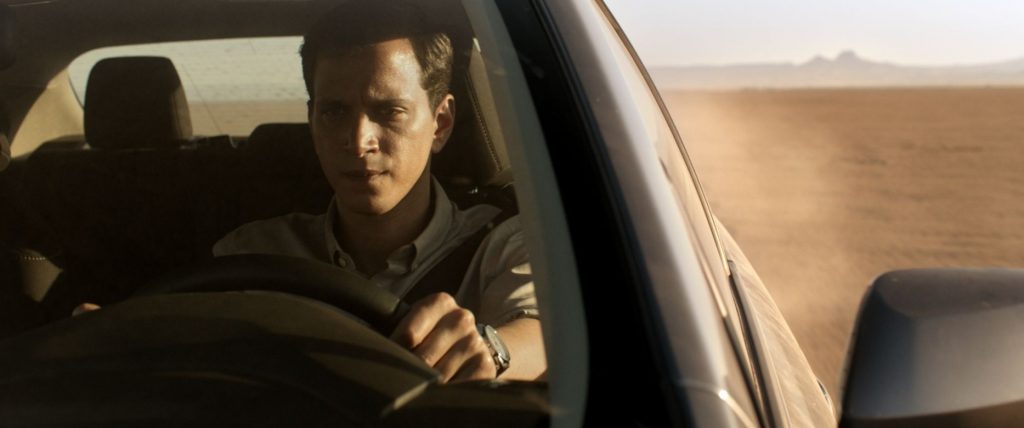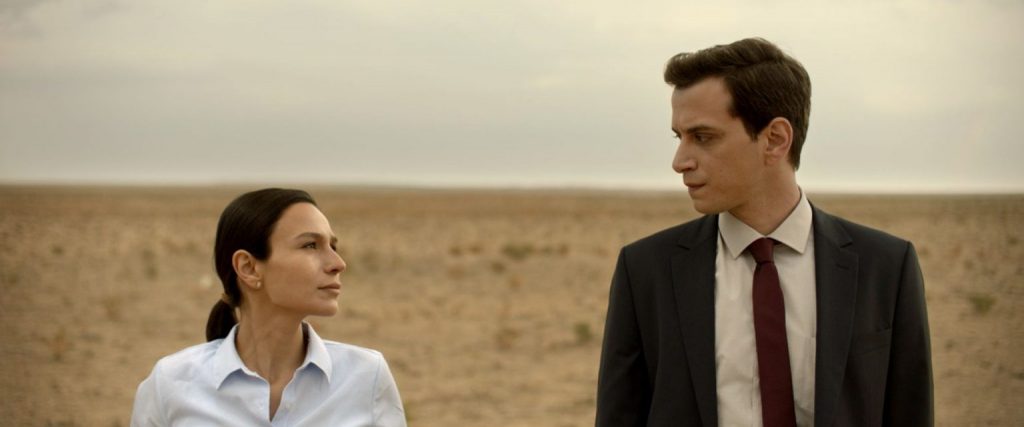
Emre, a young and dedicated prosecutor, is newly appointed to a small town hit by a water crisis and political scandals. After an initial welcome, he experiences an increasing number of tense interactions and is reluctantly dragged into local politics. When he forms a bond with the owner of the local newspaper, pressure escalates under heated rumours.
| Reviewed by: Tan Mei Qi
If you’ve ever had to watch or read any iteration of Henrik Ibsen’s An Enemy of the People, Burning Days (2022) will feel more than familiar. A young and strait-laced prosecutor, Emre (Selahattin Paşali), finds himself in rural Turkey as a replacement for his predecessor who left the post under mysterious and suspicious circumstances. Located in a desert that sees little rainfall, small-town Yaniklar’s politics are heavily shaped by the need for water. Against this backdrop, Emre’s job to investigate a sinkhole possibly caused by groundwater drilling and his power to stop the operation is sufficient to cast him out of the fold of the town’s goodwill. However, further cementing his alienation is his greater-than-thou view of the town’s parochialism and growing closeness with Murat (Ekin Koç), the editor of the town’s opposition press.
Unlike Ibsen’s play, water quickly fades out of the film’s concern when Pekmez, a local mentally-disabled Romany girl, is violently assaulted and raped. Emre dives headfirst into the investigation, only to be confronted by his possible involvement, which likely took place at a dinner with the mayor’s son, Sahin (Erol Babaoglu). But with his memories of the night fogged over by a raki-induced haze, he finds himself being pulled both ways by the shady testimonies of Sahin who affirms his complicity, and Murat who claims to be his alibi.
It is here that the film takes on a Nolan-esque arc à la Memento, the 2000 neo-noir mystery thriller. Punctuating Emre’s highly-disorienting flashbacks are scenes intercut by a darkness that hops in and out, alternately taking out and restoring Murat’s presence next to Emre each time our view becomes unobstructed. This sense of disorientation is heightened at the film’s climax, where flashlights carried by Sahin and crew create a strobe-like effect as they crest and fall with the characters’ running. This adds much flair to an otherwise extremely slow-burn thriller, a reward for the viewer’s patience with the almost torturous pace at which the film’s conflicts develop.
In an interview, Alper highlights that “[t]his film is completely about a society which is dominated by men and their inner conflict”. This comes through in the stifling and claustrophobic feel that permeates Burning Days, with its artful flashbacks that keep us locked firmly within the recesses of Emre’s mental back-and-forth. The female characters, even with one of them being at the centre of one of the film’s many conflicts, are sidelined by the story. Judge Zeynep (Seli̇n Yeninci), who has not only learned how to play by the rules of her deeply misogynistic society, but also how to flourish under them, contains the potential of an interesting backstory, but remains overlooked and underdeveloped. Consequently, despite the film’s critique of a chauvinistic and patriarchal culture, it somewhat remains a product of that very culture.
But perhaps the narrow lens of Burning Days is the point. The hot, sandy lands that stretch out for miles in wide-angled shots are a fitting visual for the arid and lifeless environment created by toxic masculinity. Despite the expansiveness of both the setting and cinematography, the audiences are trapped, psychologically, socially and against their will, with the patriarchy in the enclosed and suffocating space of the film.
In an intense opening sequence featuring the spectacle of a local boar-hunt, a crane shot tracks the captured boar being dragged slowly through the streets by a jeep, leaving behind a disturbing, dark streak of blood in its wake. Alper constantly toys with the idea of the hunter versus the hunted—the townspeople against the boars, the prosecutor against the townspeople, and vice versa. It is an unsubtle metaphor, but with the rape and homoerotic subplot, a profoundly unsettling one that allows the film to capture the fear and anxiety of being queer or a woman in a society ruled by sexist and homophobic right-wing populism.
Though a curiously double-edged commentary on gender politics, Burning Days nevertheless remains an important rumination on increasing social and political conservatism in contemporary Turkey. What the film lacks in speed, it makes up for in style and an open-ended but satisfying conclusion. _ Tan Mei Qi: When not deep-diving into the trove of queer Asian dramas and cinema, Mei Qi is busy wishing that Ghibli food was real. |
Click Here For More Film Reviews
Do you love writing? Send us a film review and we will feature it on our website. Any film that people can see in the theater or online. Email to: media@scape.sg
This review is also published on Singapore Film Society as part of *SCAPE’s Film Critics Lab: A Writing Mentorship Programme.



